|
If Acts 1 & 2 arranged themselves around friends and colleagues and characters at 85 Fleet Street, this one picks up a few scenes from when we were allowed out of the building to pursue some live stories. These stories were not always live for the originally intended news rationale: Hopefully the four scenes below will be self explanatory. But first, a gratuitous picture as a scene-setter for summer 1975. 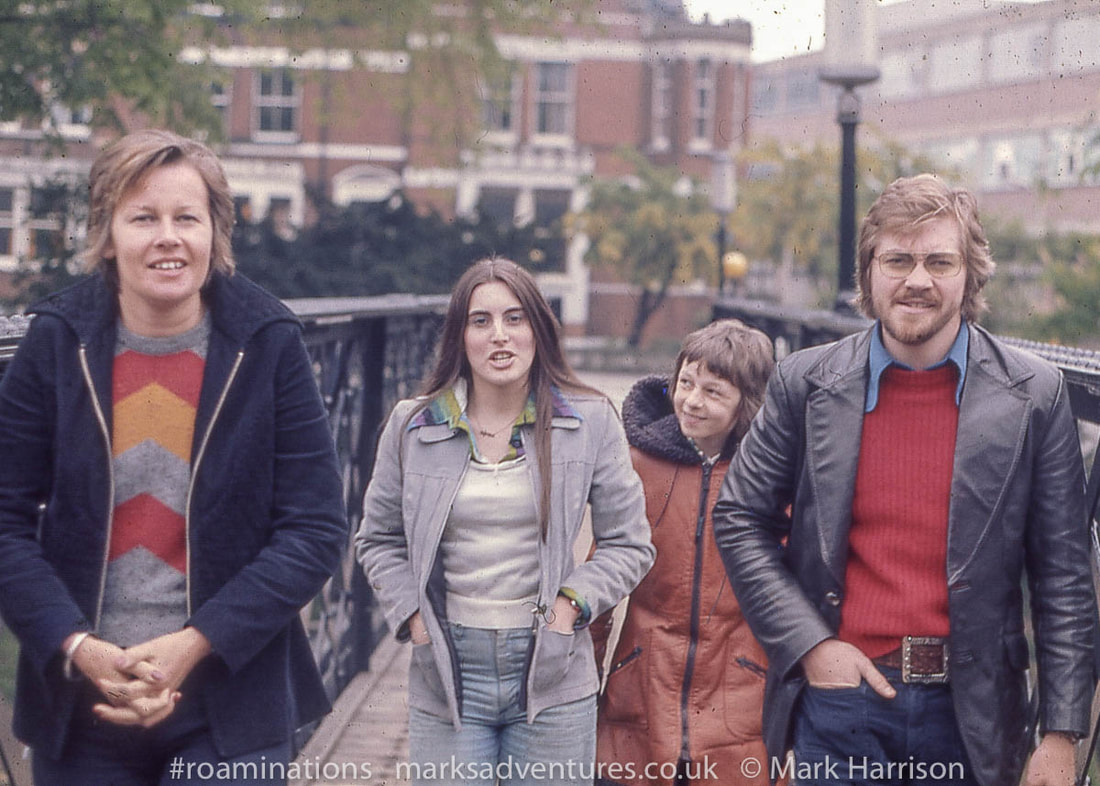 The Venters were a significant influence in our summer of '75 ... including holidaying together on the continent in their Kombi. Here Carmela gets to know (from l to r) Susi, herself, Cornelia and Lester. Lester Venter meets Joshua Nkomo This is not really a story about Joshua Nkomo. Mr Nkomo was one of the foremost politicians in Southern Africa at that time. He founded and led the Zimbabwe African People's Union (ZAPU) and later served as Vice-President of Zimbabwe from 1990 until his death in 1999. This is partly a story about the relationship between politicians and journalists and the expectations around victuals and, even more so, libations consumed during a meeting and who would pay for them. It is also a story about kindness, discretion and hospitality. Before anyone jumps to conclusions about any suggestion that Mr Nkomo, as an important Black politician, was unique in his expectations, I have personally experienced exactly the same air of entitlement from a lily-white Conservative Government Minister, pretty recently. Back to the beginning of this encounter between Messrs Nkomo and Venter. It was arranged that they would breakfast together at the Dorchester in Park Lane, London. Lester knew the drill. Credit Cards were by no means ubiquitous in those days so my erstwhile colleague ensured that he withdrew oodles of boodle from the bank the day before, confident in the knowledge that company expenses would ultimately cough up. I cannot be sure if libations were part of what was a sumptuous Dorchester feast but I am aware that a fair number of folding notes were required. Both diners were still seated when their server discreetly handed the bill to Lester. Confident in the assumption that he had even more notes than needed in his wallet, which was nestling comfortably in a pocket, he reached into his jacket. He extracted the wallet turning tactfully towards her, careful to maintain an angle subtly out of view of his guest. As soon as Lester opened the wallet, it became clear to both parties that the notes had disappeared. Without hesitation and deploying the sleight of hand of a host used to discretion, she managed to convey to my friend that she understood his situation and that he should speak to her after the two men had said their farewells. Leaving the Dorchester later with the assurance that there had obviously been a genuine mistake that Lester could rectify as soon as he could (which he did) our man tried to unravel the mystery of the missing loot. Turns out that his wife Susi had been hanging up his jacket, spotted the cash and thought it was the month’s housekeeping. What with one thing and another she’d forgotten to tell her husband before he beetled off early for an important breakfast with the Zimbabwean dignitary. Miss World 1974 Another story that suddenly thrust itself into the South African limelight would seem like an anachronism to today’s readers for a number of reasons. The first of these being the existence of an international contest judged almost exclusively on the basis of a parade of young women wandering around the Royal Albert Hall in a London winter in their bathing suits. Then there was the fact that the initial winner, crowned in front of 30 million TV viewers, “resigned” after 4 days to protect the Miss World Organisation (MWO) from embarrassment. It had come to light that she was an unwed mother. It all started when Miss United Kingdom, Helen Morgan, was crowned Miss World on the 22nd of November 1974. Anneline Kriel, Miss South Africa, was second and there were three other runners-up: Miss Israel, Miss Australia and Miss USA. Following Miss Morgan’s resignation, Miss Kriel was summoned to step into the breach by the MWO, which was a flagship for the Mecca Bingo company, and was run by Eric and Julia Morley. There was a press conference on the 28th of November. Being that Miss South Africa was soon to assume the crown of Miss World, two of us attended from the Argus bureau. I believe Bob Kirwin was there with a photography hat on and I was the reporter. A far cry from the Albert Hall, the “re-crowning” was held in a nondescript room in Mecca’s London HQ. It seemed to me as an observer that the new Miss World had been caught in the headlights and was ill-prepared for an impromptu launch such as this one. The Apartheid question was bound to arise and did. Hard as nails Julia Morley fielded these. Miss World was always supposed to be a money-spinner and Mrs Morley was determined on damage limitation. As a side-observation, it appears there was one delicious irony in that objections were alleged to have been raised by Miss USA and Miss Australia on the grounds of Apartheid. Fair enough but the story goes that the objections were overcome by Team USA scoring a busy schedule for Miss Kriel in the States. I’d love to be cynical and say that Anneline knew what she was getting into taking part in beauty pageants but she just looked like the vulnerable 19-year-old she was, standing there in the the shadow of the hatchet-faced Mrs Morley. 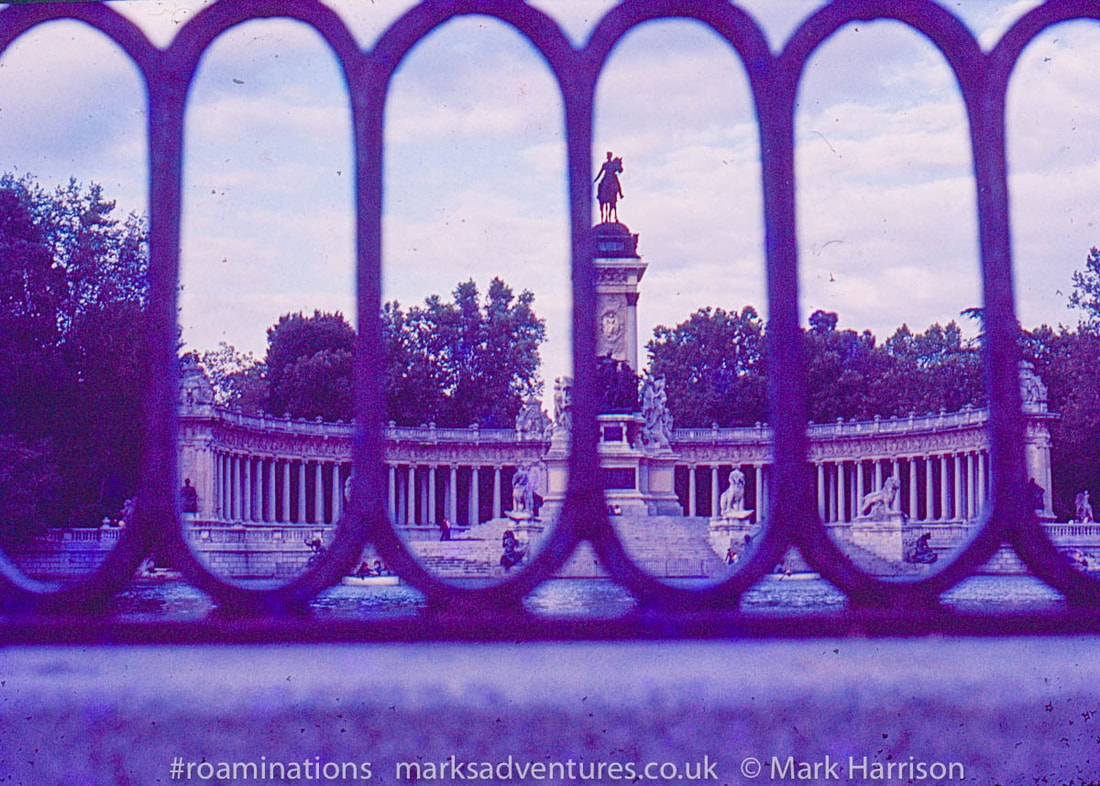 Generalisimo Franco was just about clinging to life and power in his gigantic palace (top) in mid 1975. There were Guardia Civil about in their extraordinary hats but rumour had it that it would be illegal to photograph them. I took the coward's way out by snapping a gentler young man in uniform in a quiet moment with his girlfriend in the rose garden near the palace (middle). Madrid had a lot of monuments: Alfonso XII (bottom) The World is a small place that includes Madrid Every now and then there was a job with exotic travel and Eldrid Retief, our News Editor, used to share these out in rotation. Mine was to be sent to Madrid to cover the 1975 international conference of the Chambers of Commerce. There was a fairly strong South African contingent and Edward Heath[2] was to make the keynote speech. The story begins with a salutary lesson at Heathrow. Fortunately I had nothing to hide but, even so, it could have ended badly. I was waiting for the flight to Spain and we were all packed into a pre-boarding waiting room. While standing there minding my own business, an attractive blonde American engaged me in conversation. She was on her first trip out of the USA and was a little nervous. It may seem irrelevant at this point in the narrative but I had also recently grown my first beard My blonde acquaintance had flown into Heathrow from the States and started quizzing me on the protocols of travel in Europe. I didn’t know much more than she did, to be honest, but I tried to help. After a while I happened to glance around the room and noticed a seated woman looking at me rather intently. Her scrutiny was a little baffling until a spark of recognition told me that this was Mrs Rowney. Mrs Jean Rowney, in fact. A great family friend of my parents and of my Aunt and Uncle in Durban. Our families had spent a lot of time together when I’d been much younger. Long before I had a beard. She thought she had recognised me but couldn’t quite be sure. Our eyes locked and we smiled. This was her cue to approach. “It is Mark, isn’t it?” Mrs Rowney exclaimed, gesturing towards my new acquaintance, “And this must be your lovely wife?” Try to get out of that one. Carmela was as dark-haired and pale- skinned as this young American was blonde and tanned. And the more innocent the story, the more dodgy it sounded. I invited Mrs Rowney to share a taxi with me into the city centre. She declined. I seem to remember her reason being that she had her own arrangements, probably with a tour group. “I’m a bit nervous going in a European cab for the first time,” the American woman interjected, “would you mind if share the taxi with you?” We all got separated when we boarded the plane but I was easy to identify at the other end and was joined by my blonde acquaintance. As she and I were clambering into a taxi at the arrivals rank, I spotted Mrs Rowney looking in my direction again. She was with some other people I seem to recall. She waved back. The taxi dropped my friend near the Prado and continued on to the Melia Castilla, a rather vulgar but luxurious modern 4-star hotel a little out of the centre. I couldn’t believe I’d been booked into such extravagance for a business trip. As it turned out, the conference was a bore and none of the copy was used, despite the King of Spain and Ted Heath’s appearances. Obviously history has agreed with the Argus editors and me because I could find no trace of the event having occurred when doing my due diligence. My Mum used to write to me in the UK occasionally. About a month later an epistle arrived with the statement: “We believe you have a beard now.” I wrote back querying how they knew. Perhaps another month later another letter arrived with the helpful “a little bird told us”. I racked my brains as to who the “little bird” might have been. We hadn’t seen Mum’s old friend Molly Parker since Christmas and the beard had happened long after that. I did wonder what other tidbits had travelled via the bush telegraph but never followed it up. There had been no hole to start with and any more digging would surely provoke one parent to nod knowingly, one of them quoting: “The lad with protest too much, methinks.” Hilton bomb On the 5th of September 1975, two people were killed and 63 injured when a bomb exploded in the lobby of the Hilton Hotel on London’s Park Lane. It was a major worldwide news event and I was sent to report in situ. Actually, the closest any reporter could get was behind the police cordon on the opposite side of Park Lane, in other words on the South Eastern corner of Hyde Park. The police on the cordon were there for crowd control and knew little more than the throng of reporters and photographers firing questions at these officers of the law. As was often the case in major events like this, reporters would undoubtedly have been more effectively deployed back in the office on a telephone. It was a sad event and probably the worst in London in 1975, which saw more than a dozen major terrorist incidents that killed 8 and injured more than 175. That year had enjoyed a long warm summer and it was a beautiful day in Hyde Park but hardly the atmosphere for a carnival. While pondering this, I turned away from watching the Hilton for a moment and spotted a man in a city suit and bowler hat approaching the rear of the crowd of journalists. He was carrying an old fashioned deck chair. He seemed to favour a patch of sunlight about 10 feet from where I was standing. The first thing he did was open the chair and set it in a reclining position. I then noticed he had an umbrella that he hung neatly on the back of the chair. This was followed by the bowler hat, which sat perfectly on one corner of the backrest. Next came his suit jacket and tie, which were folded neatly and placed alongside umbrella and hat. He then sat down and removed his shoes and arranged them tidily on the grass next to the chair. Into those went his socks, rolled perfectly, one in each shoe. Job done, I thought. He could now relax and enjoy the sun. But, no. Standing up again he removed and folded his shirt and added it to the growing pile on the backrest. His last act was to remove the pinstripe trousers, They followed the same treatments as the shirt and jacket before them whereupon he finally settled down in his pearly white Y-fronts for a bit of sunbathing. I didn’t stay to watch him reverse the process as I had to get back to Fleet Street. Coming soon: Europe Grand Tour and London Wrap up a.k.a. Act 4
[Endnotes]:
2 Comments
The more you dig the more you find. What had been intended as one episode of Fuzzy Photos & Unreliable Tasting Notes (FP&UTN) has expanded into three (and probably even four, the way things are going). Some of the snippets are more interesting than the original stories so I will tackle them one by one. Fleet Street Characters In Act 2 I will shine a light on some of the participants across a broad spectrum of news production in Fleet Street. This leads to a question as to the appropriate generic noun for people involved in the production of newspapers? In the absence of anything more imaginative or original, I'll have to resort to the term Character. The newspaper world was made up of a multi-faceted population of editors, photographers, reporters, copy typists, copy couriers, sustenance providers, cleaners, the partners of all of the above and many more. First, some feedback from and about some of these characters resulting from comments on "Act 1": I touched briefly on Bob Kirwin, our pictures editor and somewhat of a guru in the ways of Fleet Street, London and British culture. At least he was to a bunch of Seffrikkin rookies, to whom Monty Python was the height of culture. Apart from his deportation order from Zambia that Lester corrected me on, Mr Venter also recalled: "I was struggling to remember the name of a minor classical painter who always included a tiny mouse in his paintings of busy scenes. "Bob ventured, unhelpfully: 'Was it maybe Mickey Angelo?'" And, when Bob commented thus on the English climate: "I missed last summer. I was in the kitchen at the time,” he couldn’t have anticipated the irony that 1975’s summer was only overshadowed for abundant sunshine by 1976’s. We would have taken Bob’s quip as gospel as we had not yet had our own experience in the ensuing months to refer to. I have also heard from Alan Duggan and Neville Woudberg, both of whom, somewhat unhelpfully, made me realise how the Argus had lured secondees to the bright lights and paid them a pittance. Neville had been in the same office 10 years earlier and earning £5 a week more than me then. And Alan, bless his cotton socks was there at the same time, but under his own steam, and earning £25 a week more than me with 5 guineas a published photo as a bonus. No wonder he could fly to New York from time to time when I could just about manage a bus to Paris. I wouldn't have missed it for the world, though, especially the Grand Tour with Lester and his family. I’ll devote the following episode to that particular escapade. Neville and George Muller also confirmed my suspicions that Dirk de Villiers had been a formidable rugby player, having played centre for Western Province in the 1950s. And now back to the narrative: A titanic character in the history of 85 Fleet Street was Lil, combined sustenance provider and cleaner. Every weekday mid-morning our newsroom door would clatter open dramatically accompanied by an earsplitting shout of “TRAHLLLEEEEE". A few seconds later a laden tea trolley would enter the room, seemingly self-propelled. It was only after the tea wagon was fully through the door that it was possible to see the diminutive, ageless lady providing its impetus. I doubt the wares were exactly the pinnacle of culinary delight but a queue instantly formed and Lil smiled and joshed with everybody until the line had been satisfied and trolley and she disappeared as suddenly as they'd arrived. This continued like clockwork for months and many of the seconded staff assumed that was all that Lil was about, a jolly purveyor. Then, one day No. 85 had a bomb scare. There were a lot of them about in the mid-70s. We were all herded out of the building and on to the opposite side of the media artery that was Fleet Street. The bomb squad swarmed into the building. A number of them had explosive detectors with which to sweep the building. Those things that look like long sticks with a handle at one end and and angled plate at the other. We all stood there wondering what would happen next. An explosion in this location would certainly be ideal for maximum publicity. The tension was palpable. Suddenly the sturdy front doors flew open in a way that could have been the burst of air ahead of an explosion just in front of the fireball. Instead, a livid Lil was thrust from the building clutching a vacuum cleaner. An equally irate officer propelled her across the road to the safety offered by our midst. "What's she done?" one of the journos asked the officer. "We had completed sweeping the upper floors of the building with only the basement to complete. It was then we heard this humming, whining sound. We advanced with extreme caution only to find Madam here hoovering the floor. “'Stop right there, what on earth are you doing,’ our senior officer demanded.” "Listen you lot," Lil had responded, "If you get on with playing with your toy sticks, I'll get on with my real one." "They didn't find nothing, did they?" was her parting shot before disappearing into the crowd. The bomb squad has gone and our vantage point outside the Express deserted. Only the yellow car in front of 85 Fleet St remains. Other unsung heroes were the guys who manned the heavy duty (for the 70's) communications equipment a few flights up in the Reuters engine room. Every now and then we had to visit them, either to ask for a last minute change to a story already submitted or to expedite an urgent story of specific South African interest. We had our own telex room that chuntered away all day sending news to Argus HQ in South Africa. I think we may also have had a slow old landline machine of our own for use during the day. Can't be sure of this but I do know that the fast stuff was upstairs. When on night duty and a big story broke the reporter would have to type into a "blind" telex machine that output a paper tape of the kind used in early computer input. We'd then rush this up to the Reuters operators who'd feed the tape into their high-speed machine and start transmitting. In the mean time the reporter would be proof-reading the copy just provided (the telex machine out put a print version as well as the tape) and maintain a dialogue with the operator feeding the tape into the transmitter. If there was a mistake in the original typing of the story, and there often was, the typist would have to ask the Reuters operator to correct it. These guys could actually read punched tape and splice corrections in on the fly. That WAS a skill. One morning in Summer I was up there at sunrise with St Pauls in stark relief. Rushed downstairs for my camera ... St Pauls in all its glory at sunrise, taken from the Reuters telex room in 85 Fleet Street. We talk about night shifts but there were two. I seem to remember they overlapped a bit. One started immediately after the day shift and the other ended some time around 5 AM. Getting home was a challenge. Fleet St to Ealing was well-served by public transport but not at that time of the morning. The quickest way for me to get home would start with a brisk walk up Shoe Lane to Holborn, jump on a night bus to Paddington and then grab a train to Ealing Broadway. This required skilful timing because there was a long wait between trains if you missed the ideal one. The biggest feature of the night bus, a double decker with a conductor in those days, was the throng of cleaning ladies. Lots of them and all out of a similar mould to Lil, i.e. they were on a mission, didn't take any shit and weren't above a bit of ribald humour. Usually, when I was on this bus, its inhabitants were: 24-year-old wet behind the ears me, a conductor, around 20 women of a certain age and the driver. The cacophony was tangible. There was a brief hush when I boarded the bus at Fetter Lane on the first morning. “Ooh, ‘e’s a bit luvly, innit?" one of the bevy piped up. This was immediately followed by raucous laughter. "Look at 'im blush," another remarked, "wot a bootiful colour!” I was determined to keep my head down. “Good morning,” I greeted them with a smile, trying to make myself inconspicuous. “Ooh, ‘e’s polite, too, and with all that long ‘air and ‘igh fashion clothes,” they went on. I grinned inwardly but kept my mouth shut. Things continued in this vein until I had an inspiration: I would interview them on the rigours of working such an unsociable shift. The response was instantaneous: “But we choose it that way darlin’,” one of the group countered. “We makes the tea for the little ‘uns and then the ‘usband and then we sneaks off while ‘usband is watching telly.” “That way ‘usband ‘as no time to demand them conjugal rights,” her friend chipped in. “An’ then we gets ‘ome to make breakfast and get buggers off to work and school,” piped up another. “Only way we gets peace and quiet for decent kip,” they all nodded in assent. After that we got along smoothly. The only time they ever pissed me off was one morning when the night bus that intersected ours from Regent Street at Oxford Circus was late. Most mornings, a bunch of of the cleaners’ friends used to switch to our bus for the journey up Oxford Street. This morning the friends weren’t waiting for us. The conductor was just about to ping the driver to continue when one of our ladies rushed up to him demanding: “‘old on, Sanjay … “ “But … ,” the conductor started, only to be cut short: “Our Myrtle’s on the bus coming up Regent and we need to speak to her.” You can guess how that went: we resumed our journey 10 minutes later. Sanjay was pissed off, you could tell but he wasn’t saying anything. I was fuming, too, but I kept my counsel. Of course I did. There is one more character I want to mention in Act 2. At this rate there WILL be a 3 and 4, the former to relate some of the news assignments we covered as a team and the latter to round off after our grand European tour in Lester and Susi’s VW Kombi. That person is Garner Thompson. Garner was openly gay, which already made him exotic to a bunch of Neanderthal Seffrikkins. But he also had a fine eye for witty moments and often regaled us with a kind of verbal reveille to jump start us in the morning. Mostly they were at the expense of his mother, with whom he lived. One morning the subject of unwanted mice came up. The discussion was around humane ways to remove them from one’s abode. “My Mum told me the other day that it was cruel to poison mice,” Garner related, adding that he’d quizzed her for an alternative, to which she had replied: “Well, what you do is prepare a meal for them and then shred a Brillo pad and mash it into the meal, thereby choking the little bleeders to death.” Another morning he came bounding into the office and, before even taking off his coat, blurted: “My Mum thought cunnilingus was an Irish airline until I corrected her last night.” Some of the more proper members of the newsroom coughed involuntarily. And then one morning a new second arrived. She was a bit early and appeared to be looking for a relationship that would provide her and her small son with ready-made accommodation. At that moment Garner, a tall handsome fellow who generally wore only a turtleneck jumper on his torso. “Who is that man?” Our newcomer gasped. Cowards to a man, the rest of us introduced Garner before retreating to observe from a distance. There was a TV in the newsroom, a large one with those 1970’s protruding buttons that switched channels with a clunk. In minutes our hero was backed up against the telly with our newcomer exercising her wiles. She was being very persuasive. Garner was nodding politely. She eventually let up and left the room, at which point Garner turned his back to his assembled colleagues and lifted his jumper to reveal an inverse relief map of the television controls. He didn’t need to say anything more. The last Garner related anecdote involved the concentration of gay clubs in Earl’s Court. Some of us were intrigued by these and had been pestering Garner to take us to one. “Well, there are a whole lot of specialities in Earl’s Court,” he related archly, “Which theme would you be looking for?” This was a bit further than our imagination had extended but, after he had reeled off a list, the choice of a specialist bar for leather queens was pretty much unanimous. Some of us could even stretch to a leather overcoat. On the appointed evening, the troupe went off to the club and, sure enough, our leather was fairly pitiful. But, with drinks in hand and a comfortable place to sit we got into the vibe of the place. We’d been there a short while when the external door open and this fellow wafted in. He was as ripped as Arnie Schwarzenegger and clad in excruciatingly close fitting leather trousers and skimpy waistcoat. “See that guy over there,” Garner whispered, “He’s got a black belt in flower arranging.” Coming soon: Act 3 in which stories that got us out of the office are explored, including Lester's breakfast with Joshua Nkomo; Grand tour in which we explore Europe in the Ventermobile; Act 4 in which we enjoy the remnants of summer with friends before my secondment is completed. Endnotes: *Wenwe[1] Heaven forbid ... but, "hello? is that a mirror I see before me?" There was a certain antipodean gravitational pull. For all the excitement of being in London, there was some relief in retreating to the familiar when outside of one's comfort zone. 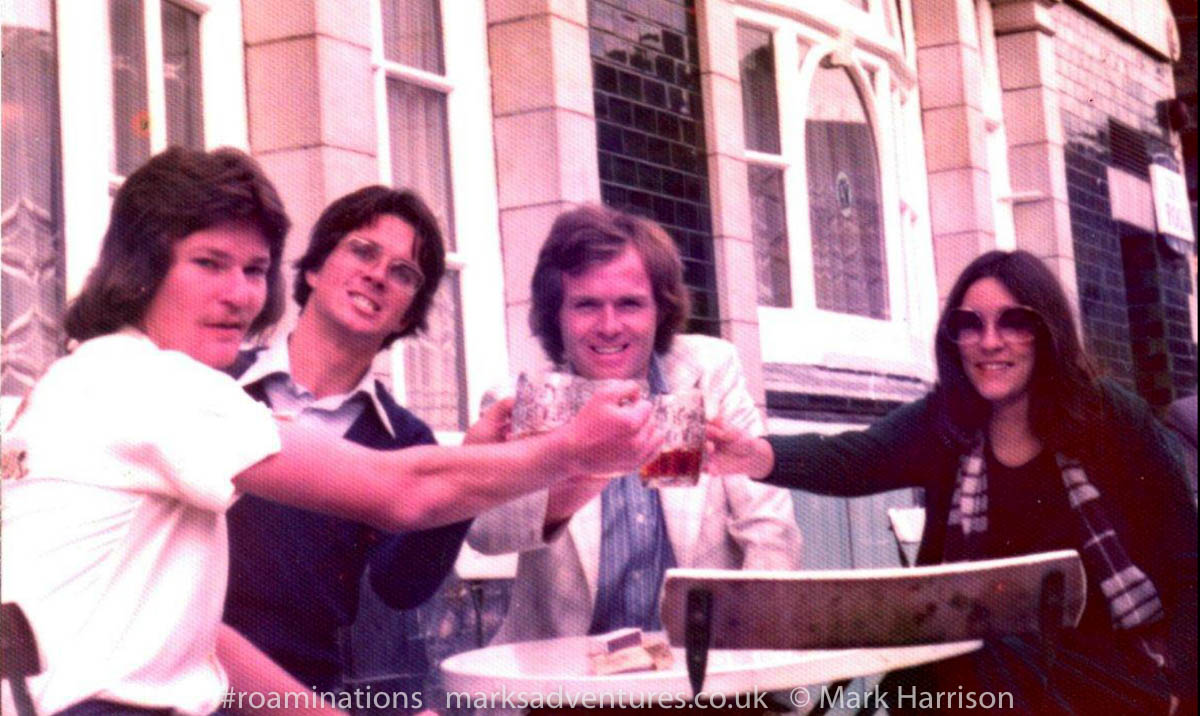 Does this bunch of Durban reprobates, drawn from all over the world, and seated in a London boozer in 1975, tell us anything?. More on this picture in Act 2. To test any theory, a token effort at due diligence has proven to be expedient. Even if only to avoid the embarrassment of a legitimate challenge to one's veracity, whether the transgression was deliberate or otherwise. "Never let the facts get in the way of a good story," is a refrain often attributed to writers in the media. I would submit this is only acceptable if it is a bloody good story and written in such a way as to combine enjoyment for the reader with a smidgeon of telltale tongue-in-cheek. The latter a sort of caveat emptor. I learned both lessons the hard way. In a very early attempt at blogging, a mundane assertion was pounced upon by two of my oldest and dearest friends. If you wish to enjoy a little schadenfreude at my humiliation, you can find it in the link above. A little chastened, I resolved to follow the advice frequently delivered by my parents and teachers during my first two decades on this planet: "Try a little harder." I hadn't realised that the research involved in "trying a little harder" was not only pleasurable in its own right but also led to a mine of additional material. This, in turn, brought a renewed raison d'être. I was delighted to reconnect with Lester Venter recently and receive this endorsement: "It may be a cliche, and it may even be a bit sad, but we have reached the age when tripping[2] down the avenue of memories is a good idea." Thus, not all Wenwe activities conform to previously narrowly-defined criteria. They can be split roughly into three categories:
An interpretation, therefore, of the title to this episode of Fuzzy Photos & Unreliable Tasting Notes (FP&UTN) might be "yes we were" and "yes we are". Yes we were Wenwes in 1975? The secondees who arrived in overlapping rotation for one or three-year stints in the Argus bureau in Fleet Street were outsiders in an office of permanent denizens. So they formed their own social group, generally bidding farewell to a departing Fleet-Street-hardened-hack and welcoming that person's successor. This is not to say the denizens were unkind to the transient journos, just that they had established roots in London and had their own routines and lives to lead. Ray Whitaker welcomed me into this unfamiliar environment and he and his wife, Jacqui helped Carmela and me to acclimatise. If you ignore the phone "booth", the Argus office at 85 Fleet Street could almost have been Dickensian. I'm not sure if Bill, on the left, had any South African background but Dirk de Villiers, on the right, certainly did. He was also a published author. They were both permanent staff of the London Bureau. I hope that Ray and I helped to soften Lester's landing. He was the next to join for a 12-month stint and came with a complete family, Susi, Cornelia and Christoph. This meant they couldn't shoehorn themselves into a studio flat as Carmela and I had done and opted for a dez rez trailer park with Thames frontage near Staines. This meant that the Venters could entertain us royally for braais[3] in the shadow of Windsor Castle. Pictures above of some of us at the Venters for a braai. The first picture is of Raymond and Jacqui with Brenda Kirwin. Brenda and Bob (our pictures editor in the light tan parka) seemed to like us and had us around to their house, where they had a souvenir from Africa in their lavatory: a order declaring him persona non grata in Zambia - It read: "Notice to Prohibit Immigrant to Leave Zambia"[4] and was framed by a lav seat. I do believe that, at this particular gathering, one of us (perhaps only I could've been that crass) had brought a Watneys Party 7 5-litre beer can. These were widely known to be impossible to open gracefully. At some stage, after much manhandling, I think Lester produced a hammer and a screwdriver. We had a magnificent fountain, redolent of a Roman candle at a different kind of braai, traditionally held on the 5th of November. You will note that discretion was the better part of valour for Raymond, his beverage being supped delicately from a smaller can. This gathering was also a tale of two Brendas with Mrs Lynsky in photo two, in which Rory is eating so delicately I at first thought he was texting on his phone, but, no, we didn't have such devices in 1975. Our hosts, Lester and Suzie, appear to be conferring on the excellent chops, which, judging by the one in Bob's hand, were rendered perfectly on the braai. Bob and Lester demonstrate that Poms can eat like Saffas and Saffas can adopt Pom refinement. The picture below has Suzie and Cornelia looking doubtful while Carmela appears to be wielding a paddle for the camera while clad in Raymond's jacket. The more substantial launch in the background will almost certainly have a Hooray Henry at the helm. He will be wearing a Commodore's cap above a cravat and navy blazer and be holding a pink gin and tonic between his left thumb and forefinger. The launch's name will be something like Sylvia, Clementine or Mirabelle. and, having passed from Starboard to Port, will inevitably return from Port to Starboard within 15 minutes. A process that will be repeated maybe 10 times over the afternoon. Remember, this pic was taken in 1975 and boats a fraction of that size were some of the little ships that crossed the Channel to Dunquerque only three-and-a-half decades previously. This used to piss Lester off greatly. In 1975 a boat with upper and lower windscreens was made for greater things than poncing a mile or so up and down the Thames every Sunday, flaunting the owner's wealth. "WTF is it called Cynthia," Lester would fume. "If it were mine, I'd just paint £50,000[5] on the side and be done with it." And so forth ... At some point that Spring/Summer, the Whitakers and Harrisons took in the Rocky Horror Show in Chelsea. I seem to recall that Jacqui had procured the tickets because she'd heard that it would not be long before the original cast would be disbanded and carted off to make the Rocky Horror Picture Show. By 1975 the live show had moved from its original 60-seat venue in an upstairs room of the Royal Court to further down Kings Road to the 500-seat Kings Road Theatre. This meant that the production team had been able to build a stage extension along the central aisle. Certainly for Carmela and me it was the first time we'd experienced anything resembling theatre in the round. We were dead impressed. Jacqui's coolth was on a steep ascent. We had to access our seats in the dark from the side aisles, directed by ushers in vampire garb with dim torches spookily highlighting their faces before motioning to the requisite seats. Soon after we were seated, a shriek cried out from close quarters. Swivelling instantly to the source of the sound we spotted that an usher had pounced on Jacqui and she was quite distressed about the unexpectedness of it all. The ushers had been running along the backs of seats and picking people at random and Jacqui was one of the first. I hope, dear Jacqui, your enjoyment of our night out was soon restored when the lights were turned up (a bit) so that Tim Curry could mince down the stage extension in ripped fishnet tights. It was an excellent production, to be followed shortly by The Rocky Horror Picture Show, which achieved a certain fame for being most popular in South Africa. Forbidden fruits sailing close to the wind perhaps? In fact, too close, it seems, as it was banned not long after its release there. Make your own minds up as to whether we were Wenwes in 1975. Look for further examples of the SA journos herd gatherings after the interval. Yes we are still Wenwes? And now back to item 3 on the Wenwe list: i.e. weren't we intrepid back in the "good ol' days"? Our days at work in Fleet Street started out in the Reuters building (first below), which faced the iconic Art Deco Express building (second below) across this fabled road in the international newspaper industry. The heart of it, one could say. Shoe Lane is just to the left of the Express providing a convenient cut-through to Holborn. We like to remember how it was when real journos wrestled with complicated sets of copy paper and carbon, three paragraphs at a time, before shouting "Copy", leading to a lot of scurrying about between reporter and sub-editor. And then, duly assembled and corrected, on to compositors and typesetters, who turned the stories into molten lead and drove around in Triumph Stags [6]. Today's journos would probably not believe the lengths we reporters had to go to deliver our stories. A small team covered most of the Northern Hemisphere that was complicated by having to get text and pics from London to South Africa and into the hands of the compositors. I started to try to describe the daily routine at 85 Fleet Street in an earlier episode but a few recent conversations with Rory Lynsky encouraged me to add a little meat to the bones. I'll get to these a little later but, first, to recap. Most of our work was in no way glamorous. Probably about 95% involved plagiarism of some sort. The Argus Group, at the time South Africa's biggest news empire, had a tiered portfolio of agreements [7] with UK national newspapers, wire services and a network of "stringers" covering mostly Europe (including further flung parts of the UK). Our job was to absorb as much as we could from the Fleet Street newspapers and monitor the wire services for anything that might be of interest to our South African readership. Actually, a lot of the time was even more mundane: we were glorified copy typists, putting on a headset and taking down European football results from said stringers. The only skill required was in the spelling of the names of the teams on the continent. I shall take Borussia Mönchengladbach with me to my grave. Only if the interest required a particularly South Africa slant, we might occasionally be sent to report on a real story. I'll follow up with a few of these in Act 2 but I'd like to conclude Act 1 with an interview with the scribe I'd known the longest, the esteemed Rory Lynsky, now resident in NSW, Australia. So without further ado, a view from Rory ... Mark: We were chatting about the denizens of the Argus bureau. You may have seen more of them, having been there for 4 years to my one? I don’t think Alex Noble ever spoke to me F2F. You could sort of see him through the frosted glass and, as you say, if you were vigilant, when he snuck out for lunch ... Rory: Yey oh yey. Mr Noble “Managing Editor “. In the first three years in London he spoke to me once. For the rest all we saw of him was when he went out for lunch. What work he did in his carpeted office remains a mystery! When he finally donned his bowler hat and took off for Chestnut Cottage ( I kid you not) and was replaced by Cliff Scott ... Sunday Trib editor, it was all change. It was at the height of the Rhoodie affair and he put a bomb under the newsroom, including Eldrid Retief and Dirk de Villiers, which was not a bad thing. Mark: Eldrid and Dirk were OK, which is why we remember them. Also Bob Kirwin. Please remind me when you first arrived in 1975. Rory: April 75. The denizens of 85 Fleet St were a nice bunch. Although I felt some of the permanent people were too comfortable in their 8 to 5 roles and used the 12 month secondees as night shift fodder. Mark: Very true although the early morning shift was a source of interesting experiences ... [8] Rory: You’ve got me going now. Soon after being installed in Lambs Apartments in Egerton Gardens we met up on the 29th April for Brenda’s 24th birthday at the Hour Glass pub around the corner. Several ex-Daily News folk squeezed into the narrowest end - Chris Harding, Wayne Brown, the Harrisons, Liz Butcher, Phil and there may have been more? After Lambs luxury we couch surfed with friends in Putney until we secured a long term lease on our flat in Ham at the end of June. In between I was sent off to Lausanne to cover the IOC meeting which was set on expelling Rhodesia from the Olympic movement. This dragged on and Brenda trained it to Switzerland to meet me, her first time on the continent Then it was a month of night duty. Mark: Your sofa surfing with friends in Putney? I remember that Carmela and I visited you and Brenda while you were staying with the Bucknalls in their terrace house in Hotham Rd. We were mightily impressed by their hospitality and that they were in the process of pasting Mary Quant granny print wallpaper on the walls and ceilings ... they must’ve been at the sharp end of the gentrification of that part of London, south of the river! Rory: They had just moved in and were doing a major renovation. Stripped the walls, lots of coats of paint. Brenda Bucknall was from Cape Town and we were in a group travelling around Europe in 68. Big sports family, her brother is Alan Lamb the England cricketer and Tony played Rugby Union (RU) for England and was captain at one stage. Mark: I think Graham Boynton still sees Alan Lamb as does Greg Sherwood, a master of wine in London, formerly of Pretoria. Returning to Fleet Street, there were some interesting characters in the office that you seem to remember better than I do? Rory: I’ve been roaminating on that photo you sent me of a mystery man in the London Office[9]. On my first day in the office I was shepherded to an empty desk between [Jock] Havers and [Justin] Dowling. After the usual polite introductions I noticed they both looked pretty down in the mouth and it emerged I was occupying the desk of a colleague who had recently shuffled off his mortal coil. So when I went to open a desk drawer to put away my meagre possessions they asked me not to as their friend's personal stuff was still occupying the drawers - and so it remained for a month until they got around to doing it. Their colleague's raincoat was hanging on a stand near the newspaper files and it was still hanging there 4 years later. Mark: You mentioned some others? Rory: Here are two for starters in no particular order and not Argus staff. I always wondered how Robin Short managed to do night shift indefinitely. He came across as somewhat reserved but once I got to know him over time found him a very warm and principled person. Perhaps night duty, where lots of the slog work was done, was an effective way of staying clear of office politics? Come summer the Shorts would invite all the secondees and families to a braai at their home backing onto the canal at Weybridge. Did you ever go? Mark: I did. Also to the Venters'. And to the Kirwans'. See pics above. Rory: Talking of parties, JJ Cornish and his lovely wife Elaine always held a Very Boozy May Day party at their home in St John’s Wood. Remember JJ’s bow tie? Mark: I remember a party. And also the bow tie. I have vague recollections of "Flaming A's" in the pub opposite: entering at one end of and exiting at the the other. Least said about that, the better (apart from the fact that the newspaper HAD to be The Times). Do you remember luring JJ, a vegetarian, to a pub in the Smithfield area, inhabited by butchers with bloody cleavers? More about both lovely Cornishes in later episodes. Anyone else that springs to mind? Rory: You’ll remember Malcolm Lawson, very jovial fellow with a gammy leg? I can’t recall what he did in administration. I got on well with him and he kindly invited us to go off and spend a few days at his cottage on the Isle of Wight. Said cottage was near Gatcombe in the centre of the island. It was on a farm road and sat on a handkerchief sized plot of land in the middle of fields. Malcolm was a bit of a dark horse as it transpired he had come across this derelict cottage and had squatted in it until he was able to “own” it. Possession is 9/10 of the law! ../.. Readers can decide whether we remain Wenwes to this day, albeit cut from a more wizened cloth, after reading Act 2, coming up in approximately a week. Coming up: Act 2 - After the Interval. More snippets from Wenwedom. Lil the trolley lady and the bomb scare. Hitching rides in a Cortina bakkie. A European Grand Tour with the Venters.
[Endnotes]:
|
Mark Harrisonsee About tab for more detail about the author Archives
April 2024
Categories |

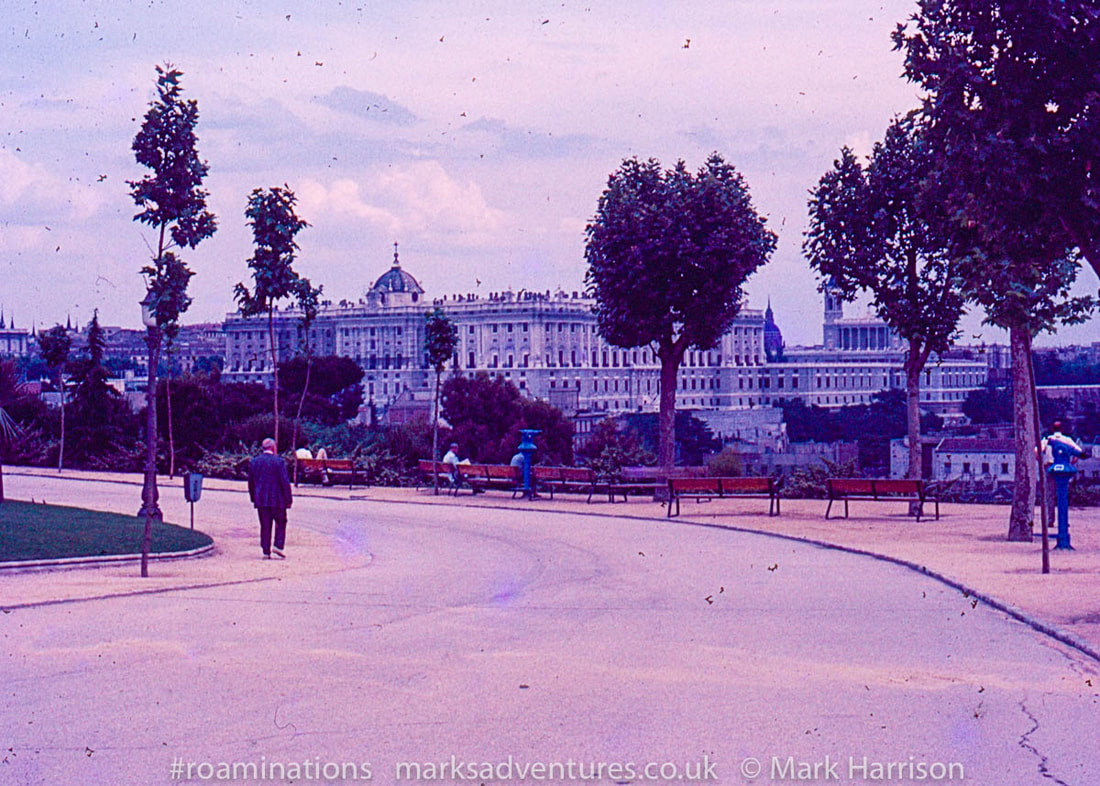
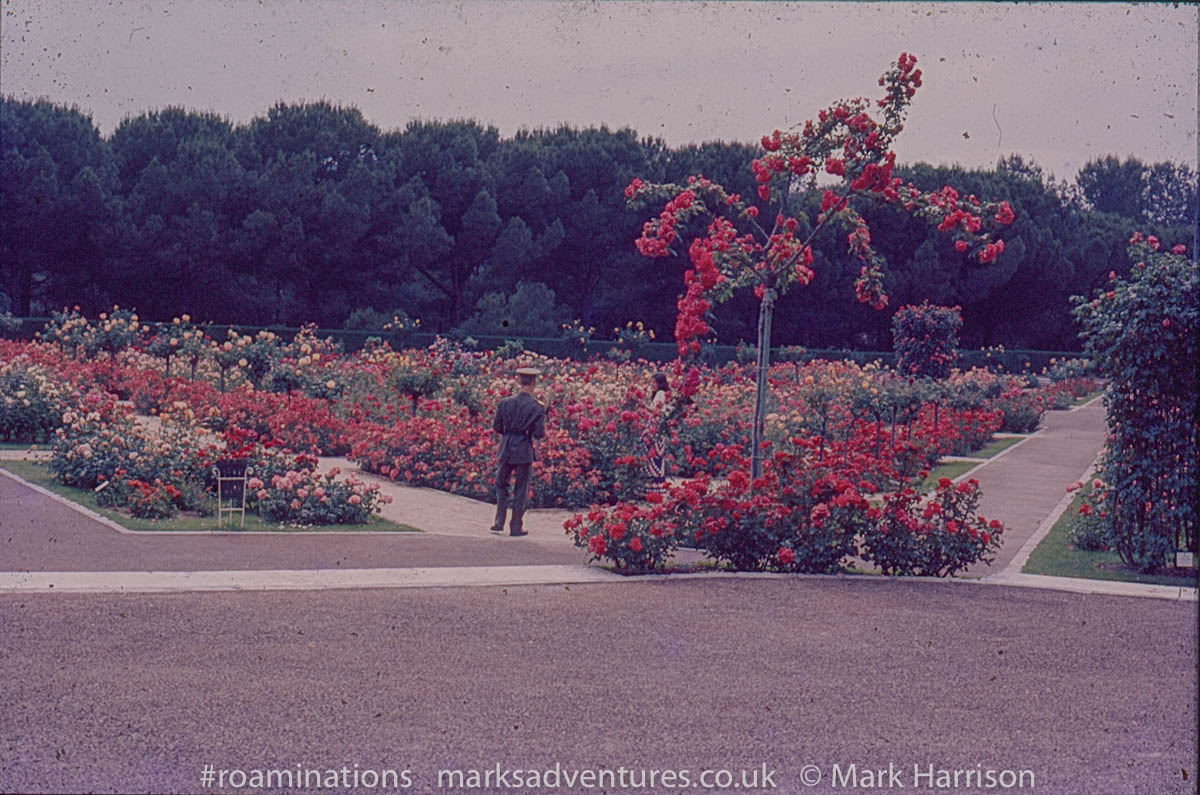
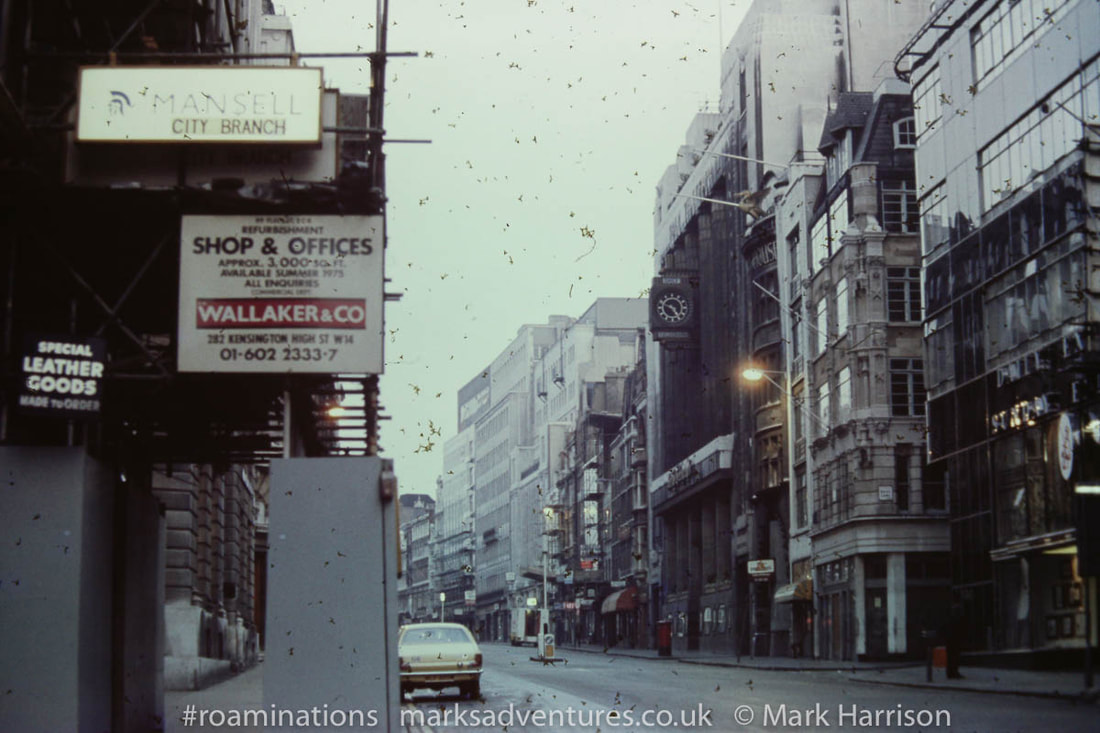
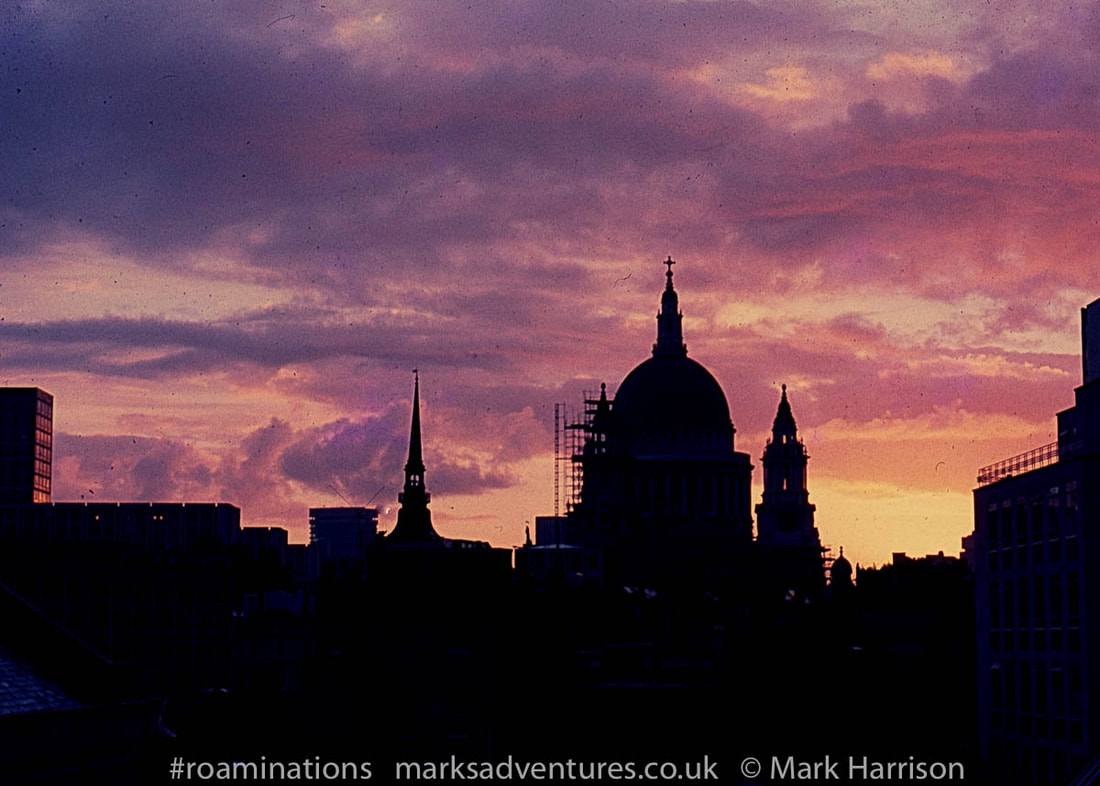
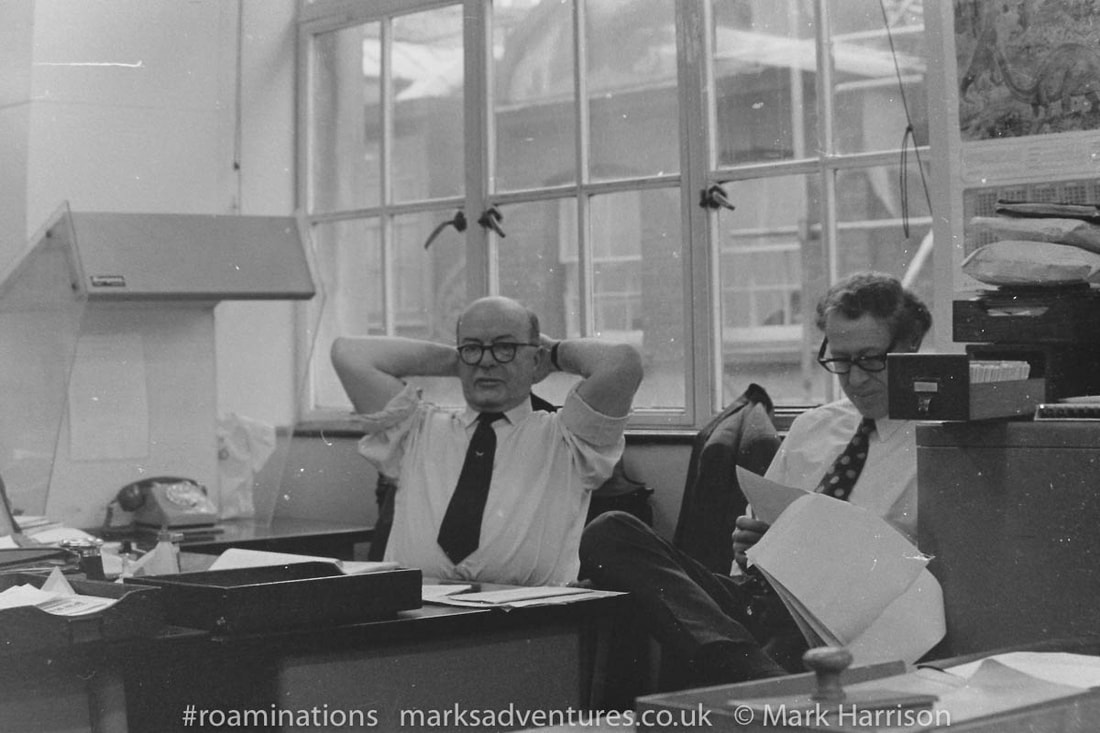
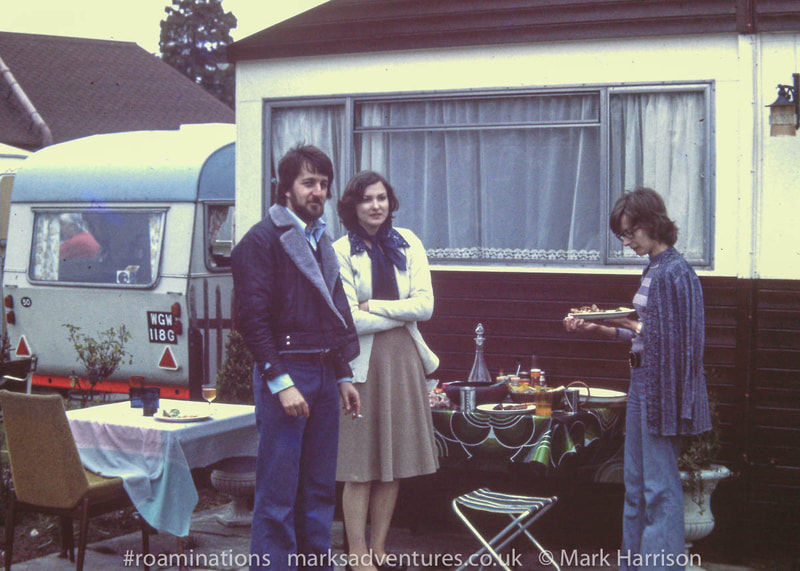

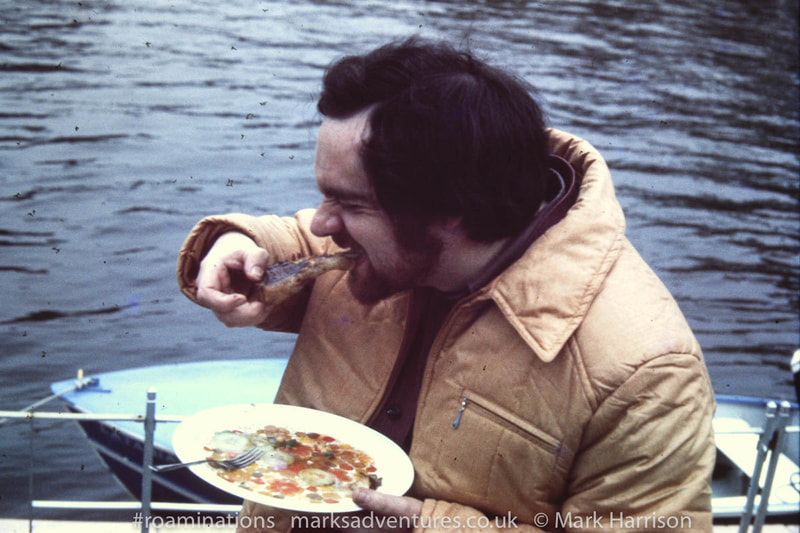
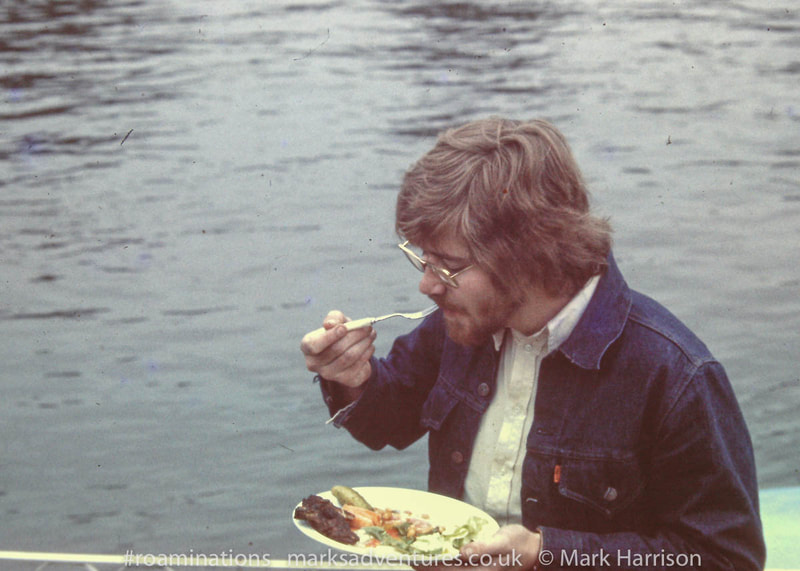
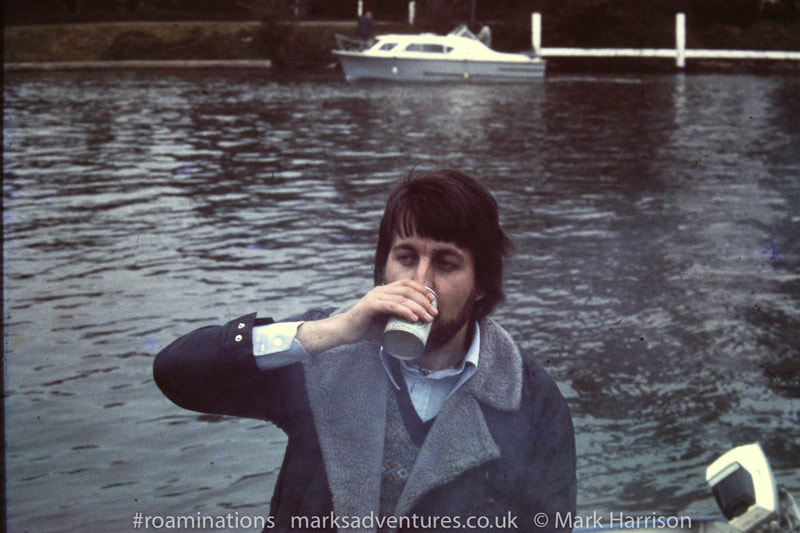
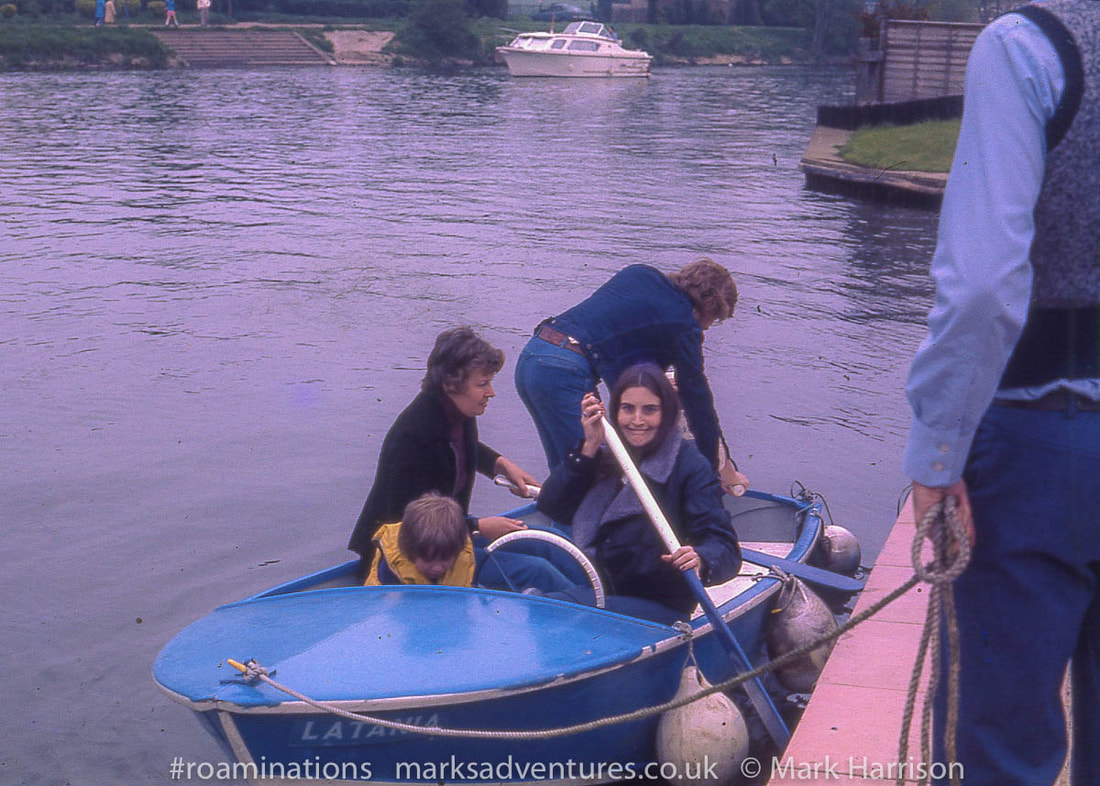
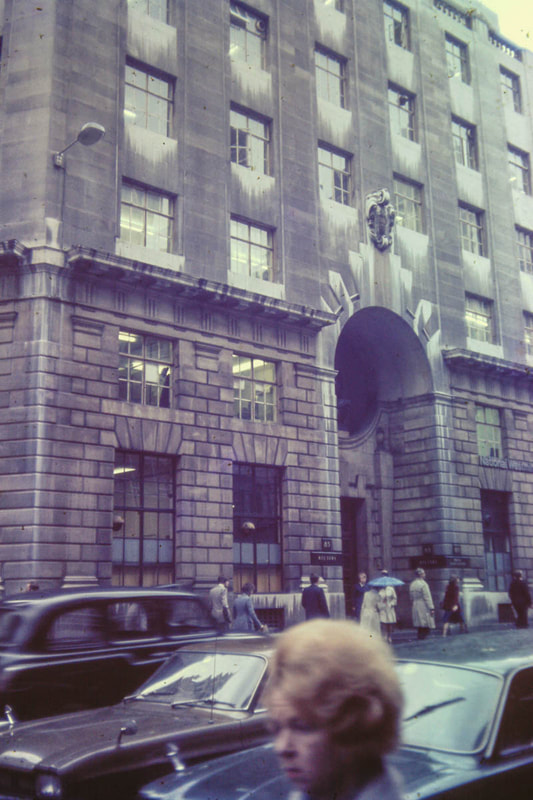
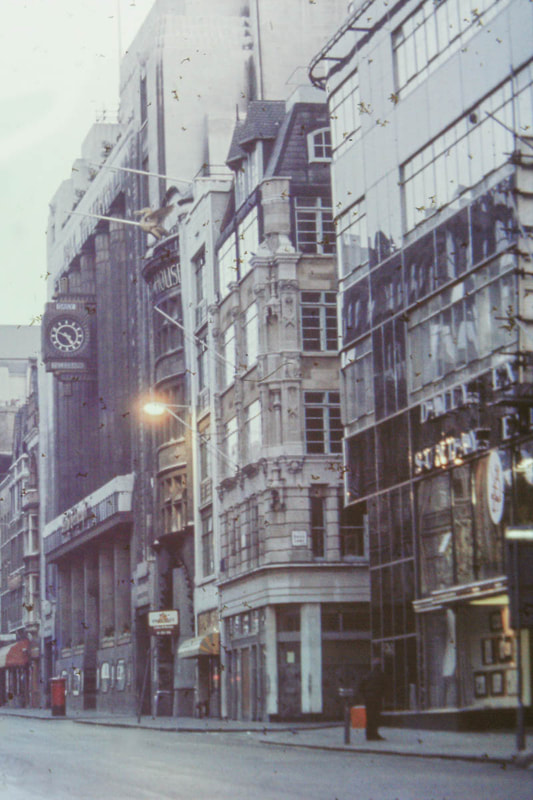
 RSS Feed
RSS Feed